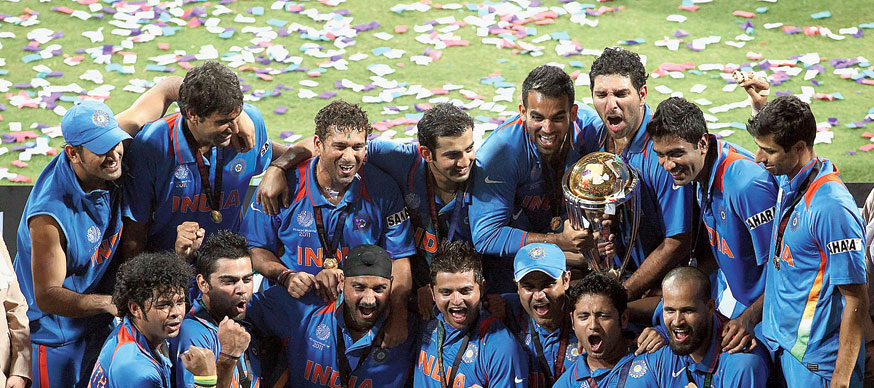Mahendra Singh Dhoni faced quite a poser the day before the 2011 World Cup final on April 2. “Will the players need sleeping pills,” a journalist enquired at the media conference.
India’s Captain Cool wasn’t flustered and replied with a straight face, “It is not a bad option. Why not sleeping tablets! Why not, if you need one, gobble it.”
The journalist was only trying to highlight the belligerence and intensity of a nation ahead of the title clash against Sri Lanka. India had not won the quadrennial showpiece event for 28 years and the pressure had been telling on the players.
“You think the semi-final wasn’t intense,” Dhoni countered, reflecting on the high-voltage victory against Pakistan in Mohali. But now it was the final that mattered to the hungry billions. It was also about Sachin Tendulkar, who had never laid his hands on the coveted trophy. From the seasoned Yuvraj Singh to the young Virat Kohli, everyone wanted to win it for him.
Mumbai’s infamous traffic snarls clogged all roads leading to the Wankhede on that sultry morning. An 8am start from Bandra culminated in reaching the stadium around noon, that too after walking the last mile or so.
The din was so aggressive that Match Referee Jeff Crowe struggled to hear the toss even though both Dhoni and Kumar Sangakkara were within touching distance of each other.
Batting first, Sri Lanka struggled against Zaheer Khan and Sreesanth. The in-form Tillakaratne Dilshan and the dangerous Sangakkara were packed off before the 30th over and Sri Lanka looked to be in tatters.
But the stylish Mahela Jayawardene had reserved one of his most glorious knocks for that day — 103 from 88 balls.
The 275-run target had never been crossed in a World Cup final and it would come down to a battle of nerves. Virender Sehwag departed to the second ball of the innings and Sachin soon became Lasith Malinga’s second victim.
At 31 for two, Gautam Gambhir and Kohli took charge. They ran the singles hard and found the gaps with alacrity once the repair act started. The pair stitched together 83 runs before Dhoni, coming in ahead of Yuvraj, and Gambhir provided the momentum. The India captain took Muttiah Muralitharan on and blunted the attack.
Gambhir fell for 97 but Dhoni and Yuvraj took India home. Dhoni remained unconquered on 91 as Wankhede erupted with 10 balls remaining.
More than an hour after he had sealed the World Cup with his now famous six off Nuwan Kulasekara over the long-on boundary, Dhoni arrived for the presser in the basement of the refurbished Wankhede, drenched in sweat and champagne.
It was well past midnight and the media was gradually getting impatient because of strict deadlines. There was not an inch of space available with people barely managing to stand on one foot while others sat on the floor. But Dhoni was in no hurry and the night just seemed young.
He had the winner’s medal around his neck, Player of the Tournament Yuvraj Singh by his side and was chuckling away to his heart’s content. The six weeks of tension and anxiety had given way to a free-wheeling display of glee and frolicking.
As the two were huddled into the room by the International Cricket Council’s media manager Sami-ul Hasan, amid a spontaneous clapping of hands by the journalists, Yuvraj responded, “badhaiyaan ho, badhaiyaan ho (congratulations, congratulations)”.
During the half-an-hour session, the two often traded jokes with Dhoni seemingly lost at times, failing to remember the first part of two long questions.
Once Dhoni even spelt out that he hadn’t had the time to have a quick bite. A packet of biscuit was on offer to satiate his hunger.
It was one occasion when none protested to the media’s presence near the dressing room once the party started. Sachin’s wife Anjali and their children were there. Anil Kumble, then the Karnataka State Cricket Association president, and commentator Sourav Ganguly also made their presence felt.
Champagne flowed as the music blared through the open doors and the players broke into an impromptu bhangra. They popped the finest of Moet & Chandon Magnum as emotions ran high and tears flowed.
The players sang “Tujh mein rab dikhta hai” much to the embarrassment of Sachin. Sudhir Gautam, the tri-colour draped fan who epitomises the Indians’ fervour around the world, was also invited into the dressing room by the Master himself.
It was during that post-match media conference that Dhoni revealed that Yuvraj had been “vomiting a lot”. It was then put down to anxiety and pressures of playing a World Cup at home.
Only later did Yuvraj come to know it had just been the early signs of what turned out to be the biggest battle of his career — the fight against cancer.
Almost four hours after it had all ended as I stepped out of the Wankhede, the exotic atmosphere propelled by a few dancing thousands on the streets made me realise that the sounds of revelry will continue into the next day.
Marine Drive never looked so alive. The air of Mumbai smelt of a mission accomplished. The dreams of a billion Indians had been answered.
Nine years ago on this day, India became the first team to win a World Cup at home. As part of our occasional series commemorating the anniversary of great sporting achievements, INDRANIL MAJUMDAR relives that magical night at the Wankhede











